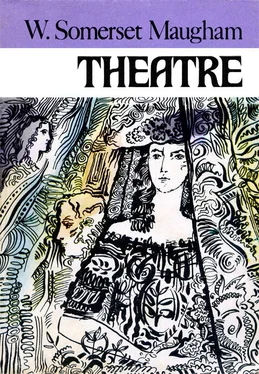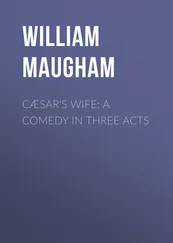It happened that when Michael kept the appointment he had asked for, Jimmie Langton was in need of a leading juvenile. He had guessed why Michael wanted to see him, and had gone the night before to see him play. Michael was playing Mercutio and he had not thought him very good, but when he came into the office he was staggered by his beauty. In a brown coat and grey flannel trousers, even without make-up, he was so handsome it took your breath away. He had an easy manner and he talked like a gentleman. While Michael explained the purpose of his visit Jimmie Langton observed him shrewdly. If he could act at all, with those looks that young man ought to go far.
‘I saw your Mercutio last night,’ he said. ‘What d’you think of it yourself?’
‘Rotten.’
‘So do I. How old are you?’
‘Twenty-five.’
‘I suppose you’ve been told you’re good-looking?’
‘That’s why I went on the stage. Otherwise I’d have gone into the army like my father.’
‘By gum, if I had your looks what an actor I’d have been.’
The result of the interview was that Michael got an engagement. He stayed at Middlepool for two years. He soon grew popular with the company. He was good-humoured and kindly; he would take any amount of trouble to do anyone a service. His beauty created a sensation in Middlepool and the girls used to hang about the stage door to see him go out. They wrote him love letters and sent him flowers. He took it as a natural homage, but did not allow it to turn his head. He was eager to get on and seemed determined not to let any entanglement interfere with his career. It was his beauty that saved him, for Jimmie Langton quickly came to the conclusion that, notwithstanding his perseverance and desire to excel, he would never be more than a competent actor. His voice was a trifle thin and in moments of vehemence was apt to go shrill. It gave then more the effect of hysteria than of passion. But his gravest fault as a juvenile lead was that he could not make love. He was easy enough in ordinary dialogue and could say his lines with point, but when it came to making protestations of passion something seemed to hold him back. He felt embarrassed and looked it.
‘Damn you, don’t hold that girl as if she was a sack of potatoes,’ Jimmie Langton shouted at him. ‘You kiss her as if you were afraid you were standing in a draught. You’re in love with that girl. You must feel that you’re in love with her. Feel as if your bones were melting inside you and if an earthquake were going to swallow you up next minute, to hell with the earthquake.’
But it was no good. Notwithstanding his beauty, his grace and his ease of manner, Michael remained a cold lover. This did not prevent Julia from falling madly in love with him. For it was when he joined Langton’s repertory company that they met.
Her own career had been singularly lacking in hardship. She was born in Jersey, where her father, a native of that island, practised as a veterinary surgeon. Her mother’s sister was married to a Frenchman, a coal merchant, who lived at St Malo, and Julia had been sent to live with her while she attended classes at the local lycée. She learnt to speak French like a Frenchwoman. She was a born actress and it was an understood thing for as long as she could remember that she was to go on the stage. Her aunt, Madame Falloux, was ‘en relations’ with an old actress who had been a societaire of the Comédie Française and who had retired to St Malo to live on the small pension that one of her lovers had settled on her when after many years of faithful concubinage they had parted. When Julia was a child of twelve this actress was a boisterous, fat old woman of more than sixty, but of great vitality, who loved food more than anything else in the world. She had a great, ringing laugh, like a man’s, and she talked in a deep, loud voice. It was she who gave Julia her first lessons. She taught her all the arts that she had herself learnt at the Conservatoire and she talked to her of Reichenberg who had played ingénues till she was seventy, of Sarah Bernhardt and her golden voice, of Mounet-Sully and his majesty, and of Coquelin the greatest actor of them all. She recited to her the great tirades of Corneille and Racine as she had learnt to say them at the Française and taught her to say them in the same way. It was charming to hear Julia in her childish voice recite those languorous, passionate speeches of Phèdre, emphasizing the beat of the Alexandrines and mouthing her words in that manner which is so artificial and yet so wonderfully dramatic. Jane Taitbout must always have been a very stagy actress, but she taught Julia to articulate with extreme distinctness, she taught her how to walk and how to hold herself, she taught her not to be afraid of her own voice, and she made deliberate that wonderful sense of timing which Julia had by instinct and which afterwards was one of her greatest gifts. ‘Never pause unless you have a reason for it,’ she thundered, banging with her clenched fist on the table at which she sat, ‘but when you pause, pause as long as you can.’
When Julia was sixteen and went to the Royal Academy of Dramatic Art in Gower Street she knew already much that they could teach her there. She had to get rid of a certain number of tricks that were out of date and she had to acquire a more conversational style. But she won every prize that was open to her, and when she was finished with the school her good French got her almost immediately a small part in London as a French maid. It looked for a while as though her knowledge of French would specialize her in parts needing a foreign accent, for after this she was engaged to play an Austrian waitress. It was two years later that Jimmie Langton discovered her. She was on tour in a melodrama that had been successful in London; in the part of an Italian adventuress, whose machinations were eventually exposed, she was trying somewhat inadequately to represent a woman of forty. Since the heroine, a blonde person of mature years, was playing a young girl, the performance lacked verisimilitude. Jimmie was taking a short holiday which he spent in going every night to the theatre in one town after another. At the end of the piece he went round to see Julia. He was well enough known in the theatrical world for her to be flattered by the compliments he paid her, and when he asked her to lunch with him next day she accepted.
They had no sooner sat down to table than he went straight to the point.
‘I never slept a wink all night for thinking of you,’ he said.
‘This is very sudden. Is your proposal honourable or dishonourable?’
He took no notice of the flippant rejoinder.
‘I’ve been at this game for twenty-five years. I’ve been a call-boy, a stage-hand, a stage-manager, an actor, a publicity man, damn it, I’ve even been a critic. I’ve lived in the theatre since I was a kid just out of a board school, and what I don’t know about acting isn’t worth knowing. I think you’re a genius.’
‘It’s sweet of you to say so.’
‘Shut up. Leave me to do the talking. You’ve got everything. You’re the right height, you’ve got a good figure, you’ve got an indiarubber face.’
‘Flattering, aren’t you?’
‘That’s just what I am. That’s the face an actress wants. The face that can look anything, even beautiful, the face that can show every thought that passes through the mind. That’s the face Duse’s got. Last night even though you weren’t really thinking about what you were doing every now and then the words you were saying wrote themselves on your face.’
‘It’s such a rotten part. How could I give it my attention? Did you hear the things I had to say?’
‘Actors are rotten, not parts. You’ve got a wonderful voice, the voice that can wring an audience’s heart, I don’t know about your comedy, I’m prepared to risk that.’
Читать дальше











